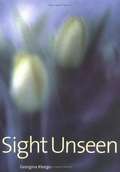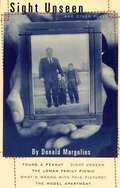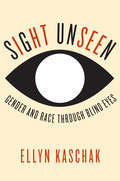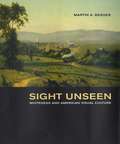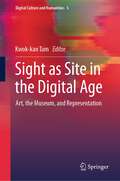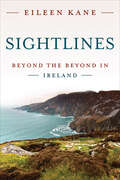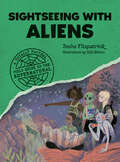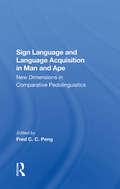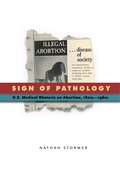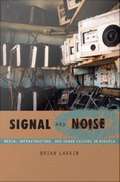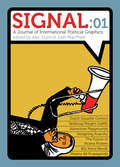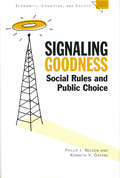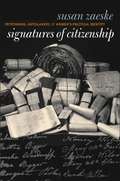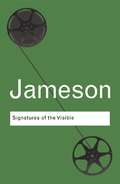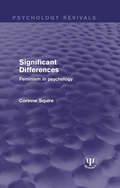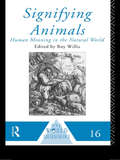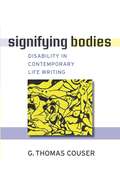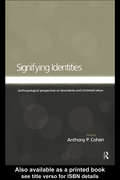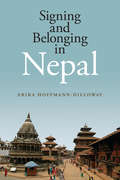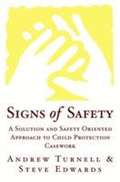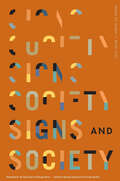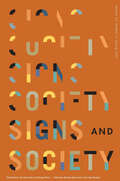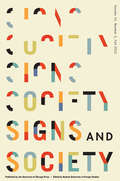- Table View
- List View
Sight Unseen
by Georgina Kleege<P>This elegantly written book offers an unexpected and unprecidented accout of blindness and sight. Legally blind since the age of eleven, Georgina Kleege draws on her experiences to offer a detailed testimony of visual impairment - both her own view of the world and the world's view of the blind. "I hope to turn the reader's gaze outward, to say not only 'Here's what I see' but also "here's what you see,' to show what's both unique and universal," Kleege writes. <P>Kleege describes the negative social status of the blind, analyzes stereotypes of the blind hat have been perpetuated by movies, and discusses how blindness has been portrayed in literature. She vividly conveys the visual experience of someone with severely impaired sight and explains what she cannot (and how her inability to achieve eye contact - in a society that prizes that form of connection - has affected her). <P>Finally she tells of the various ways she reads, and the freedom she felt when she stopped concealing her blindness and acquired skills, such as reading braille, as part of a new blind identity.
Sight Unseen and Other Plays
by Donald MarguliesIncludes: Found a Peanut, The Loman Family Picnic, The Model Apartment, What's Wrong with This Picture?, and Sight Unseen.. With a palpable affection for the traditions of the stage and a taste for surreal comedy, Margulies "manages to transform what might have been kitchen-sink drama into theatre that is unsettling, imaginative and quite hilarious"--Howard Kissel, New York Daily News
Sight Unseen: Gender and Race Through Blind Eyes
by Ellyn KaschakSight Unseen reveals the cultural and biological realities of race, gender, and sexual orientation from the perspective of the blind. Through ten case studies and dozens of interviews, Ellyn Kaschak taps directly into the phenomenology of race, gender, and sexual orientation among blind individuals, along with the everyday epistemology of vision. Kaschak's work reveals not only how the blind create systems of meaning out of cultural norms but also how cultural norms inform our conscious and unconscious interactions with others regardless of our physical ability to see.
Sight Unseen: Whiteness and American Visual Culture
by Martin A. BergerSight Unseen explores how racial identity guides the interpretation of the visual world. Through a nimble analysis of late nineteenth- and early twentieth-century paintings, photographs, museums, and early motion pictures, Martin A. Berger illustrates how a shared investment in whiteness invisibly guides what European Americans see, what they accept as true, and, ultimately, what legal, social, and economic policies they enact. Carefully reconstructing the racial and philosophical contexts of selected artworks that contain no narrative links to race, the author exposes the effects of racial thinking on our interpretation of the visual world. Bucolic genre paintings of white farmers, pristine landscape photographs of the western frontier, monumental civic architecture, and early action films provide case studies for investigating how European-American sight became inextricably bound to the racial values of American society. Berger shows how artworks are more significant for confirming internalized beliefs on race, than they are for selling us on racial values we do not yet own. A significant contribution to the growing field of whiteness studies, this accessible, provocative, and compelling book exposes how something as apparently natural as sight is conditioned by the racial values of society.
Sight as Site in the Digital Age: Art, the Museum, and Representation (Digital Culture and Humanities #5)
by Kwok-Kan TamThis volume presents a broad coverage of theoretical issues that deal with digital culture, representation and ideology in art and museums, and other cultural sites, offering new insights into issues of representation in the digitization of art. It critically examines the roles of museum and archives in the digital age and reexamines the intricate relations between sight and site in art, museums, exhibitions, theme parks, theatre performances, music videos, and films. The collection represents a multidisciplinary approach to the complex issues underlying the advent of technologies and digital culture. The rise of visual culture since the twentieth century can be accounted for by the advent of technology in film, TV, museum exhibitions, and the wide use of websites, but it can also be understood as a paradigmatic shift toward representation as a visual means to interpret culture, with new understandings of the site-sight dilemma and the co-implications in related tensions. Complicating the issue of representation is the rise of digital culture, as digital sites replace actual physical sites. This book explores how the virtual has replaced the actual, and in what ways, and to what effects, the digital has displaced the physical. With contributions by museum curators, communications scholars, visual artists, theatre artists, filmmakers, literary critics, and historians, this volume is of appeal to academics and graduate students in information science, art, media, performance, literary and cultural studies, and history. “The book binds together different concepts such as site, sight and digitalization in a very original way. It convincingly gathers contributions from academics and practitioners, artists and museum specialists. The chapters are theoretically well-founded, show an interesting breadth of content and are also dealing with current developments.”— Monika Gänssbauer, Professor of Chinese and Head of the Institute of Asian, Middle Eastern and Turkish Studies, Stockholm University, Sweden “The chapters raise important and latest questions and discussions on the impact of digital technology has on art, culture, creativity, representation and innovation. They are original in dealing with latest examples in recent years, especially during the pandemic, with reflections and philosophical discussions on the transformation digital culture undergoes in relation to human and posthuman contexts, with examinations of art works, archives and museum collections, exhibitions, theme parks, theatre performances, films and music videos that encompass cultures from ancient to contemporary, from the West to the East, and from physical to digital.”— Jack Leong, Associate Dean of Research and Open Scholarship, York University Libraries, Toronto, Canada
Sightlines: Beyond the Beyond in Ireland
by Eileen KaneIt is the 1960s, and Ireland is hoping to join what will later become the European Union. The government has devised a plan to stem emigration and save the Irish language by supporting small factories in the Gaeltacht, traditional Irish-speaking villages in remote western areas. But is the plan working? With her signature humor and charm, Eileen Kane transports the reader to County Donegal with a detailed account of rural Irish life during this period of rapid change. This is a story about people living beyond the margins of maps, boundaries, language groups, and government departments – people bound by borders that have little or no correspondence to their own cultural, economic, and historical margins. Ultimately, it is a story about life on the edges, and the places and people who fall outside them.
Sightseeing with Aliens: A Totally Factual Field Guide to the Supernatural (A Totally Factual Field Guide to the Supernatural #3)
by Insha FitzpatrickDiscover everything about aliens in this funny and informative handbook packed with weird science, fascinating history, and plenty of trivia—perfect for curious and adventurous readers ages 8–12.Are aliens out there? What&’s the deal with Area 51? Can outer space support human life? Blast off to space with Sightseeing with Aliens and discover: Cool science and eye-opening history! Learn about the past, present, and future of space exploration. Strange accounts of alien encounters! Dig into the truth behind UFO sightings, crop circles, extraterrestrial events, and more. Hands-on activities to try at home! Create a time capsule and learn how to advocate for the environment.Engaging, offbeat, and educational, Sightseeing with Aliens is an illustrated exploration of the unknown and how it can shape our lives. The whole galaxy is out there—grab your guide, and let&’s go!For more on the supernatural, check out Hanging with Vampires and Chilling with Ghosts!
Sigmund Freud
by Robert BocockFirst Published in 2002. Routledge is an imprint of Taylor & Francis, an informa company.
Sign Language And Language Acquisition In Man And Ape: New Dimensions In Comparative Pedolinguistics
by Fred C. Peng Roger S Fouts Duane M RumbaughThis volume brings together recent research findings on sign language and primatology and offers a novel approach to comparative language acquisition. The contributors are anthropologists, psychologists, linguists, psycholinguists, and manual language experts. They present a lucid account of what sign language is in relation to oral language, and o
Sign of Pathology: U.S. Medical Rhetoric on Abortion, 1800s–1960s (RSA Series in Transdisciplinary Rhetoric #1)
by Nathan StormerMuch of the political polarization that grips the United States is rooted in the so-called culture wars, and no topic defines this conflict better than the often contentious and sometimes violent debate over abortion rights. In Sign of Pathology, Nathan Stormer reframes our understanding of this conflict by examining the medical literature on abortion from the 1800s to the 1960s. Often framed as an argument over a right to choose versus a right to life, our current understanding of this conflict is as a contest over who has the better position on reproductive biology. Against this view, Sign of Pathology argues that, as it became a medical problem, abortion also became a template, more generally, for struggling with how to live—far exceeding discussions of the merits of providing abortions or how to care for patients. Abortion practices (and all the legal, moral, and ideological entanglements thereof) have rested firmly at the center of debate over many fundamental institutions and concepts—namely, the individual, the family, the state, human rights, and, indeed, the human. Medical rhetoric, then, was decisive in cultivating abortion as a mode of cultural critique, even weaponizing it for discursive conflict on these important subjects, although the goal of the medical practice of abortion has never been to establish this kind of struggle. Stormer argues that the medical discourse of abortion physicians transformed the state of abortion into an indicator that the culture was ill, attacking itself during and through pregnancy in a wrongheaded attempt to cope with reproduction.
Signal and Noise: Media, Infrastructure, and Urban Culture in Nigeria
by Brian LarkinMainstream media and film theory are based on the ways that media technologies operate in Europe and the United States. In this groundbreaking work, Brian Larkin provides a history and ethnography of media in Nigeria, asking what media theory looks like when Nigeria rather than a European nation or the United States is taken as the starting point. Concentrating on the Muslim city of Kano in the north of Nigeria, Larkin charts how the material qualities of technologies and the cultural ambitions they represent feed into the everyday experiences of urban Nigeria. Media technologies were introduced to Nigeria by colonial regimes as part of an attempt to shape political subjects and create modern, urban Africans. Larkin considers the introduction of media along with electric plants and railroads as part of the wider infrastructural project of colonial and postcolonial urbanism. Focusing on radio networks, mobile cinema units, and the building of cinema theaters, he argues that what media come to be in Kano is the outcome of technology's encounter with the social formations of northern Nigeria and with norms shaped by colonialism, postcolonial nationalism, and Islam. Larkin examines how media technologies produce the modes of leisure and cultural forms of urban Africa by analyzing the circulation of Hindi films to Muslim Nigeria, the leisure practices of Hausa cinemagoers in Kano, and the dynamic emergence of Nigerian video films. His analysis highlights the diverse, unexpected media forms and practices that thrive in urban Africa. Signal and Noise brings anthropology and media together in an original analysis of media's place in urban life.
Signal: A Journal of International Political Graphics & Culture (Signal)
by Josh MacPhee Alec DunnDedicated to documenting the compelling graphics, art projects, and cultural movements of international resistance and liberation struggles, this unique resource serves as an active discussion of the role of art in revolution. Introducing the artists and cultural workers who have been at the center of upheavals and revolts, this work expands beyond graphic arts and includes political posters, comics, murals, zines, and features works from both present and past—from political freight train graffiti to subversive photo montages in 1980s San Francisco.
Signaling Goodness
by Phillip J. Nelson Kenneth V. GreenePolitical, intellectual, and academic discourse in the United States has been awash in political correctness, which has itself been berated and defended -- yet little understood. As a corrective, Nelson and Greene look at a more general process: adopting political positions to enhance one's reputation for trustworthiness both to others and to oneself. Phillip Nelson and Kenneth Greene are Professors of Economics in the Department of Economics at the State University of New York, Binghamton.
Signature Pedagogies in Police Education: Teaching Recruits to Think, Perform and Act with Integrity (SpringerBriefs in Criminology)
by Brett ShiptonThis book provides a range of detailed solutions to issues in police education and training by bringing awareness to pedagogies that can improve the application of theory into police practice and encourage police problem solving skills. The chapters dedicated to each of the four signature pedagogies provide an understandable foundation in learning theory and go on to provide specific guidance for design and facilitation. Each pedagogy chapter includes contextual examples that apply specific teaching and learning techniques underpinning the pedagogy, with a focus on effective facilitation processes informed by learning theories and Shulman’s structure of thinking, performing, and integrity-based practice. Importantly, the book will draw together these separate pedagogical approaches to describe how they can be integrated into a broader curriculum framework that allows them to be synergized with each other and more traditional practices to deliver a balanced program that builds a bridge between theory and practice. It is an ideal reference for police educators, police managers, and policing academics involved in academy and field training programs.
Signatures of Citizenship
by Susan ZaeskeIn this comprehensive history of women's antislavery petitions addressed to Congress, Susan Zaeske argues that by petitioning, women not only contributed significantly to the movement to abolish slavery but also made important strides toward securing their own rights and transforming their own political identity. By analyzing the language of women's antislavery petitions, speeches calling women to petition, congressional debates, and public reaction to women's petitions from 1831 to 1865, Zaeske reconstructs and interprets debates over the meaning of female citizenship. At the beginning of their political campaign in 1835 women tended to disavow the political nature of their petitioning, but by the 1840s they routinely asserted women's right to make political demands of their representatives. This rhetorical change, from a tone of humility to one of insistence, reflected an ongoing transformation in the political identity of petition signers, as they came to view themselves not as subjects but as citizens. Having encouraged women's involvement in national politics, women's antislavery petitioning created an appetite for further political participation that spurred countless women after the Civil War and during the first decades of the twentieth century to promote causes such as temperance, anti-lynching laws, and woman suffrage.Petitions representing only a fraction of those signed by hundreds of thousands of men and women calling for the abolition of slavery received by Congress between 1831 and 1863. Courtesy of the Foundation for the National Archives.-->
Signatures of the Visible
by Fredric JamesonIn such celebrated works as Postmodernism: The Cultural Logic of Late Capitalism, Fredric Jameson has established himself as one of America‘s most observant cultural commentators. In Signatures of the Visible, Jameson turns his attention to cinema - the artform that has replaced the novel as the defining cultural form of our time. Histori
Significant Differences: Feminism in Psychology (Psychology Revivals)
by Corinne SquireCurrent western feminism and psychology have a particularly close relationship, with feminism finding an increasingly important voice in psychology. In this clear introductory text, originally published in 1989, Corinne Squire examines what feminism and psychology mean to each other, concentrating on the different ways in which feminism is articulated in psychology. Each of the feminist ‘movements’ within psychology is explored, with clear and critical explanations of the ways in which they differ significantly from conventional psychology. Squire looks at the dominant, egalitarian form of feminist psychology, which tries to work within traditional psychology, and at the woman-centred feminist psychology, which has developed largely outside the conventional discipline, and analyses the limitations and advantages of these approaches. She goes on to look at more complex feminist attempts to deal with psychological concerns, and identifies feminist initiatives, throughout psychology and outside it, which manage to address psychological issues but refuse to respect the boundaries of mainstream psychology, forming instead helpful associations with other forms of knowledge in order to change the nature of psychological discourse.
Signifying Animals: Human Meaning In The Natural World (One World Archaeology #Vol. 16)
by Roy WillisA fresh assessment of the workings of animal symbolism in diverse cultures. Reconsiders the concept of totemism and exposes common fallacies in symbolic interpretation.
Signifying Bodies
by G. Thomas Couser"Thomas Couser'sSignifying Bodiescomes at a crucial moment when debates about physician assisted suicide, genetic engineering, and neo-natal screening are raising the question of what constitutes a 'life worth living' for persons with disabilities. Couser's work engages these debates by exploring the extensive number of personal narratives by or about persons with disabilities. As Couser brilliantly demonstrates through synoptic readings, these works challenge the 'preferred rhetorics' by which such narratives are usually written (triumphalist, gothic, nostalgic) while making visible the variegated nature of embodied life. " ---Michael Davidson, University of California, San Diego "Signifying Bodiesshows us that life writing about disability is . . . everywhere. . . . From obituary to documentary film to ethnography to literary memoir to the law, the book casts a wide net, detailing how various written and filmed responses to disability both enact and resist conventional narrative patterns. [This] not only broadens our idea about where to look for life writing, but also demonstrates how thoroughly stereotypes about disability mediate our social and artistic languages---even when an author has (so-called) the best intentions. " ---Susannah B. Mintz, Skidmore College Memoirs have enjoyed great popularity in recent years, experiencing significant sales, prominent reviews, and diverse readerships. Signifying Bodiesshows that at the heart of the memoir phenomenon is our fascination with writing that focuses on what it means to live in, or be, an anomalous body---in other words, what it means to be disabled. Previous literary accounts of the disabled body have often portrayed it as a stable entity possibly signifying moral deviance or divine disfavor, but contemporary writers with disabilities are defining themselves and depicting their bodies in new ways. Using the insights of disability studies and source material ranging from the Old and New Testaments to the works of authors like Lucy Grealy and Simi Linton and including contemporary films such asMillion Dollar Baby, G. Thomas Couser sheds light on a broader cultural phenomenon, exploring topics such as the ethical issues involved in disability memoirs, the rhetorical patterns they frequently employ, and the complex relationship between disability narrative and disability law. G. Thomas Couser is Professor of English at Hofstra University.
Signifying Identities: Anthropological Perspectives on Boundaries and Contested Identities
by Anthony P. CohenThis collection of extended papers examines the ways in which relations between national, ethnic, religious and gender groups are underpinned by each group's perceptions of their distinctive identities and of the nature of the boundaries which divide them. Questions of frontier and identity are theorised with reference to the Maori, Australian aborigines and Celtic groups.The theoretical arguments and ethnographic perspectives of this book place it at the cutting edge of contemporary anthropological scholarship on identity, with respect to the study of ethnicity, nationalism, localism, gender and indigenous peoples. It will be of value to scholars and students of social and cultural anthropology, human geography and social psychology.
Signing and Belonging in Nepal
by Erika Hoffmann-DillowayWhile many deaf organizations around the world have adopted an ethno-linguistic framing of deafness, the meanings and consequences of this perspective vary across cultural contexts, and relatively little scholarship exists that explores this framework from an anthropological perspective. In this book, Erika Hoffmann-Dilloway presents an accessible examination of deafness in Nepal. As a linguistic anthropologist, she describes the emergence of Nepali Sign Language and deaf sociality in the social and historical context of Nepal during the last decades before the Hindu Kingdom became a secular republic. She then shows how the adoption of an ethno-linguistic model interacted with the ritual pollution model, or the prior notion that deafness results from bad karma. Her focus is on the impact of these competing and co-existing understandings of deafness on three groups: signers who adopted deafness as an ethnic identity, homesigners whose ability to adopt that identity is hindered by their difficulties in acquiring Nepali Sign Language, and hearing Nepalis who interact with Deaf signers. Comparing these contexts demonstrates that both the ethno-linguistic model and the ritual pollution model, its seeming foil, draw on the same basic premise: that both persons and larger social formations are mutually constituted through interaction. Signing and Belonging in Nepal is an ethnography that studies a rich and unique Deaf culture while also contributing to larger discussions about social reproduction and social change.
Signs Of Safety: A Solution And Safety Oriented Approach To Child Protection Casework
by Steve Edwards Andrew TurnellThis book presents a revolutionary approach to child protection work. It focuses on the question, "How can child protection professionals actually build partnerships with parents where there is suspected or substantiated child abuse or neglect?" The authors bring the solution orientation to child protection work, expanding the investigation of risk to encompass signs of safety that can be built upon to stabilize and strengthen the child's and family's situation. The philosophy behind this approach is clearly articulated through ten practice principles that serve as guiding beacons for child protection workers as they traverse the rough waters of abuse and neglect investigation. Child protection workers are involved with vulnerable, at-risk children in potentially volatile situations. Here they will find a new child protection assessment and planning protocol that allows for comprehensive risk assessment incorporating both danger and safety and the perspectives of both professionals and service recipients (parents). The authors provide practical, hands-on strategies for building a partnership with parents, which may, in the long run, prevent abuse and family dissolution. They illustrate these strategies in cases showing the subtle process of integrating the seemingly opposite notions of coercion and cooperation. Respectful, optimistic, and highly practical, this book promises to revitalize and redirect child protection services.
Signs and Society, volume 10 number 1 (Winter 2022)
by Signs and SocietyThis is volume 10 issue 1 of Signs and Society. Signs and Society is an open-access, multidisciplinary journal in the humanities and social sciences focusing on research that examines the role of sign processes (or semiosis) in social interaction, cognition, and cultural formations. Focusing directly on semiosis in its multiple dimensions, the journal aims to promote collaborative translation across analytical categories and technical vocabularies already established in anthropology, linguistics, semiotics, and related disciplines, and to uncover unanticipated parallels in the ways semiosis is manifest in diverse empirical domains.
Signs and Society, volume 10 number 2 (Spring 2022)
by Signs and SocietyThis is volume 10 issue 2 of Signs and Society. Signs and Society is an open-access, multidisciplinary journal in the humanities and social sciences focusing on research that examines the role of sign processes (or semiosis) in social interaction, cognition, and cultural formations. Focusing directly on semiosis in its multiple dimensions, the journal aims to promote collaborative translation across analytical categories and technical vocabularies already established in anthropology, linguistics, semiotics, and related disciplines, and to uncover unanticipated parallels in the ways semiosis is manifest in diverse empirical domains.
Signs and Society, volume 10 number 3 (Fall 2022)
by Signs and SocietyThis is volume 10 issue 3 of Signs and Society. Signs and Society is an open-access, multidisciplinary journal in the humanities and social sciences focusing on research that examines the role of sign processes (or semiosis) in social interaction, cognition, and cultural formations. Focusing directly on semiosis in its multiple dimensions, the journal aims to promote collaborative translation across analytical categories and technical vocabularies already established in anthropology, linguistics, semiotics, and related disciplines, and to uncover unanticipated parallels in the ways semiosis is manifest in diverse empirical domains.
